
By: Asjad Nazir and Dharmesh Patel
WHEN Kabhi Kabhie was released in cinemas on February 27, 1976, it took everyone by surprise.
It was a great romantic movie made during an era dominated by action and presented a reigning superstar in a way thought unimaginable.
By combining the rule-breaking approach with a strong storyline, a big star cast, stunning music and superb performances, ace director Yash Chopra created an all-time classic.
As the film commemorates 48 years since its release, Eastern Eye presents 12 reasons why it continues to be hailed as a masterpiece.
Story: Pamela Chopra, the wife of producer and director Yash Chopra, conceived a multifaceted love story rich in layers. While the primary narrative revolves around a poet grappling with heartbreak, the film also explores subplots touching on the themes of adoption, family dynamics, hidden pasts and even a love triangle among the younger generation. Spanning across different time periods, this narrative approach weaves the diverse elements into a cohesive whole.
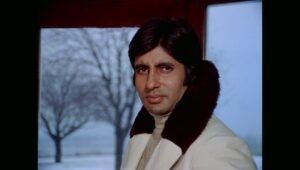
Casting: The magnificent multi-starrer assembled one of the greatest ever star casts, headlined by Amitabh Bachchan, shortly after he had established himself as the undisputed king of Bollywood. Rakhee Gulzar, Shashi Kapoor, Rishi Kapoor, Neetu Singh and Waheeda Rehman were the other stellar names signed by Yash Chopra for his ambitious venture. All of them added a different dimension to their respective roles. The impressive supporting cast included Simi Garewal.
Performances: A story centered on human emotions and relationships demanded stellar performances from the entire cast. The seasoned actors, at the peak of their craft, delivered nuanced portrayals that breathed life into the diverse characters.
From the poignant journeys of separated lovers Pooja (Raakhee) and Amit (Amitabh Bachchan) across different stages of life, to the enigmatic elderly Anjali (Waheeda Rehman) concealing a secret and the adorable Vijay (Shashi Kapoor) navigating his wife’s past, each character embodied a spectrum of emotions. The young lovers embroiled in a complex triangle further added depth to the narrative. With each role finely etched, the supporting cast contributed significantly to enriching the film’s impact.
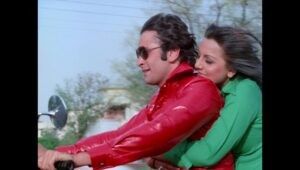

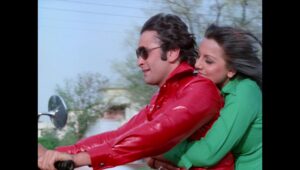
Rulebreaker: The director dared to be different and delivered a romance during an era that was dominated by action movies, which included his own. From its thematic focus to its innovative narrative structure and ageing Bollywood’s biggest star Bachchan, Kabhi Kabhie broke the rules and created new ones. The film’s themes served as an inspiration for subsequent generations of filmmakers, such as Karan Johar, who embraced similar unconventional storytelling methods.
Music: The story of a poet’s unrequited love meant the music had to be strong and ace composer Khayyam delivered one of the finest soundtracks of his career. He assembled the dream team of ace lyricist Sahir Ludhianvi, along with brilliant singers, led by Lata Mangeshkar and Mukesh for the magnificent collection of timeless musical numbers. The terrific title track is rated as one of the finest Bollywood love songs in history and remains popular to this day. The film was nominated in multiple categories at the Filmfare awards, but won only four honours. Three of them were for best music director (Khayyam), best lyricist (Sahir Ludhianvi) and best male playback singer (Mukesh).
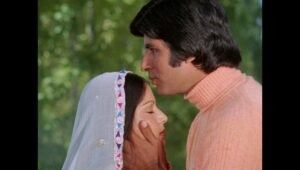

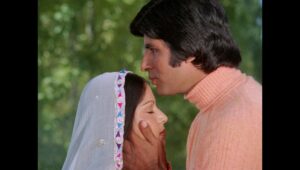
Words: Whether it is the lyrically rich songs, deep poetry or the unforgettable dialogues, there are few films filled with more beautiful words than this classic. Yash Chopra took his lifelong love for wonderful writing and injected it into each frame. The result was a rare contemporary film that was an audio delight for audiences watching and why many of the lines are still quoted almost 50 years later.
Progressive parents: Previously, parents in Bollywood were often depicted as disapproving patriarchs entrenched in tradition. However, with Kabhi Kabhie, a shift towards more progressive portrayals of parenthood emerged.
When Vijay learns of his wife’s past with the poet, his jealousy is tempered by reason, showcasing a more nuanced approach to marital conflicts.
Additionally, instead of resorting to strictness, Vijay fosters a friendly rapport with his son, promoting open communication over authoritarianism. Similarly, Pinky’s (Neetu Singh) parents choose honesty by revealing her adoption. Furthermore, Anjali’s acceptance of her adopted daughter and Vijay urging his son to embrace life reflect a departure from the traditional parental role.
Locations: Predominantly set in the picturesque landscapes of Kashmir, the movie showcases eye-catching locations. The director adeptly captures the region’s diverse natural elements, portraying its beauty and serenity, with all four seasons seamlessly woven into the narrative.
Inspiration: There are elements of Kabhi Kabhie in many of the all-time greatest movies that were made in subsequent decades, including the two distinct storylines across different time periods being stapled together. Then, there are themes like parental approval, a more understanding husband, adoption, unrequited love and past secrets, which would later pop up in movies in a similar way to the 1976 classic.



Values: While love takes centre stage in Kabhi Kabhie, the director ensures that traditional Indian values remain integral to the narrative. This is exemplified by Pooja’s acceptance of her arranged marriage, without rebelling against her parents’ decision and Amit’s tearful acceptance of this outcome.
Despite the heartbreak of losing his love, Amit’s dignified response underscores his commitment to upholding the honour and reputation of Pooja and the elders involved. This portrayal of sacrifice is presented in a positive light, distinguishing the film from typical escapist love stories.
Love: Instead of just focusing on one aspect of romance, Kabhi Kabhie presents love in different forms and knits them together seamlessly.
The romantic themes it explores includes the short-lived whirlwind romance, heartbreak, jealousy, moving on, marital bonding, flirting and love triangles. There is someone lamenting of a lost love and romance across different generations.
The movie also explores unconditional parent love and human relationships.
Eternal: A movie many considered ahead of its time, Kabhi Kabhie still remains relevant today, with relatable emotions and themes. Like most Yash Chopra classics, it can still be enjoyed, has important life lessons and continues to find new audiences.


